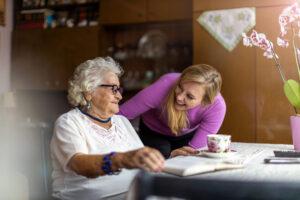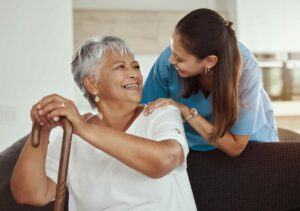As we get older and less mobile, we go out less, spending less time with others and more time at home. Particularly for those who live alone, this can result in social isolation. Unfortunately, approximately one in five older Australians experiences social isolation[1] and this can lead to significant effects on a persons physical and mental well-being. At Home Care Assistance, our Care Professionals not only provide care services, but also act as in-home companions to help prevent social isolation.
Effects of Social Isolation
Social Isolation can lead to a number of negative consequences. These include:
- Faster cognitive decline. A lack of social interaction means less stimulation for a person. Cognitive abilities decline faster if they are not used regularly. Someone who is not having interactions with others is losing opportunities to think, talk and maintain their cognitive skills.
- Poorer self-care. We have all experienced the effect of social interactions on our motivation to look after ourselves – get dressed, shower, do our hair. People who are not interacting socially can lose that motivation resulting in poorer self-care.
- Poor nutrition. It is especially important for older people to eat enough nutrient rich foods. A lack of social interaction can not only result in poorer eating habits but might also mean nobody notices there is a problem until the situation is more serious.
- Mental health issues. A lack of social connectedness can result in feelings of loneliness which can cause depression and other mental health issues.
- Alcohol and drug use. The loneliness that can arise from a lack of social interaction can lead to a misuse of alcohol and drugs resulting in a range of health issues.
- Serious injuries. Seniors who live alone are more likely to do tasks they can no longer do safely resulting in serious injuries. This includes things like climbing a ladder to change a light bulb or climbing a chair to reach something up high. This can result in falls leading to serious injury.
The consequences of social isolation can lead to poorer physical and mental health, a poorer quality of life, serious injury and even an earlier death. Given the consequences of social isolation, it is important to take steps to avoid this.
How Can an In-Home Companion help?
A Care Professional can provide in-home companionship that can help your loved one avoid issues associated with social isolation. Our Care Professionals provide social connection by simply being in the home and talking to your loved one. This provides mental stimulation through interaction as well as motivation for your loved one to implement self-care. If personal care is becoming difficult, our Care Professionals can aid with this. A Care Professional providing in-home care and companionship can help with meal preparation and ensuring your loved one eats the right foods. They can also help with those minor, incidental tasks like getting things down from up high that can lead to serious injury if performed by an older person.
The act of having someone in the house regularly that can help with care as necessary and provide companionship can also help seniors avoid the issues around mental health and alcohol that can occur with social isolation.
In-home care by a Home Care Assistance Care Professional not only helps with the parts of living that your loved one need assistance with, but also provides companionship. This companionship plays an important role in helping avoid social isolation and the various physical and mental health issues that can arise from that.
Support of an in-home care agency like Home Care Assistance, can bring enormous benefit and comfort to your quality of life while living independently at home. Home Care Assistance has viable solutions when it comes to supporting independent living. For more information, get in touch with a Home Care Assistance near me today.
[1] https://www.aihw.gov.au/getmedia/d18a1d2b-692c-42bf-81e2-47cd54c51e8d/aihw-australias-welfare-2017-chapter5-1.pdf.aspx
As a leading age care provider, Home Care Assistance offers tailored in-home care services for older Australians, enabling them to live happier and healthier lives in the comfort of their own homes.
We offer private and government subsidised Care Packages and have office locations that are a registered NDIS provider. Our Care Workers undergo extensive training in order to deliver unmatched in-home aged care services where people can continue ageing in place. We are proud ambassadors of the My Aged Care government funded aged care program, enabling Australians to successfully navigate the process and gain approval for in-home care support packages. Home Care Assistance offers hourly care, specialised care, Alzheimer’s and Dementia care, hospital to home care, and 24 hour in home care.













